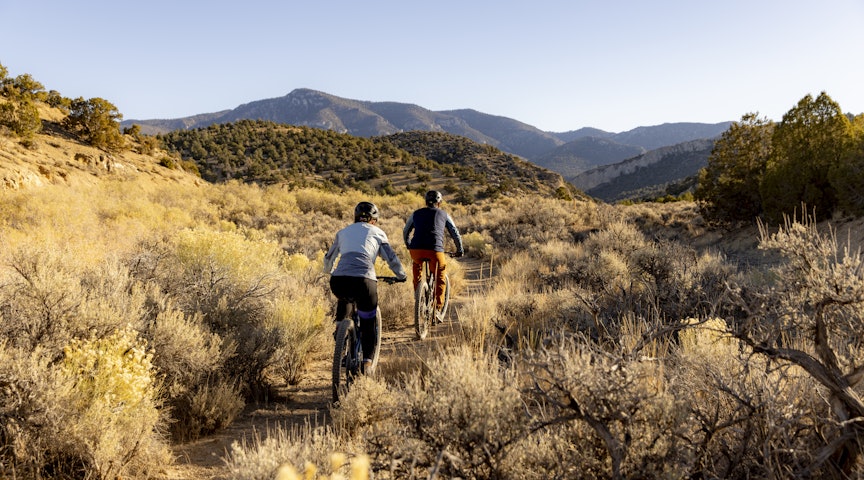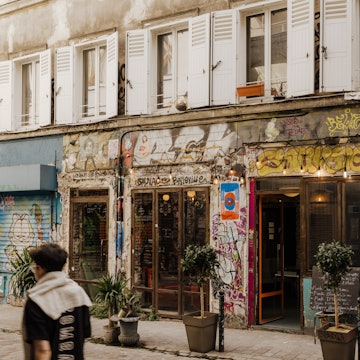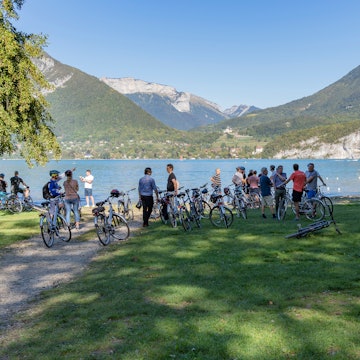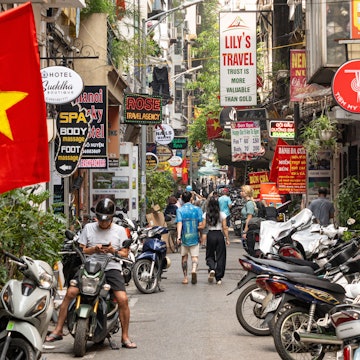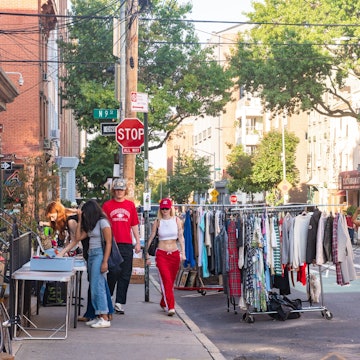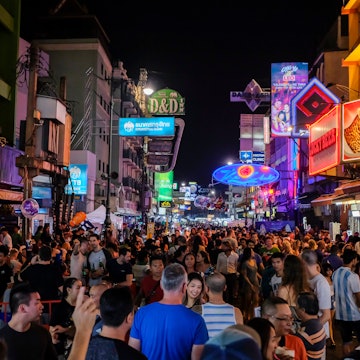

Evita Robinson began NOMADNESS Travel Tribe in 2011 © Courtesy of Evita Robinson / Pete Monsanto
Travel is a celebration of diversity. The all-sensory adventure of cultural immersion gives the curious tourist an ability to understand, empathize and connect with people and ideas that once seemed foreign.
But when it comes to the travel industry, diversity is often an afterthought. While businesses flaunt the cultural wonders of far-flung destinations, many fail to represent travelers of different races, sexualities, genders, disabilities, ages, and religions in their marketing campaigns and on-site offerings.
These professionals are effecting change in the industry by creating spaces for travelers who are just as diverse as the places they explore.
Evita Robinson
"If I don't see it, I create it," says Evita Robinson, the leader of NOMADNESS Travel Tribe – an online social community primarily for travelers of color. "The travel industry excluding my demographic from their marketing and representation is what turned me into an entrepreneur," she says.
Evita started NOMADNESS in 2011 with roughly 100 travelers. Today, she’s joined by a colorful crosshatch of over 25,000 people worldwide. The tribe, which is 78% female and contains a large percentage of Millennial BIPOC travelers, celebrates their robust LGBTQ+ community, people with disabilities, Gen Z trendsetters, and even Baby Boomer vagabonds.
"I'm a dreamer," Evita muses, "but even the biggest dreamers need to see ourselves in certain positions or certain locations around the world to be like, 'Oh my gosh - I can do that. I can go there. There are no boundaries.'"
In 2018, Evita launched Audacity Fest - a gathering where travelers of color and their allies can connect with likeminded folx, network with industry leaders, and get ready for their next big trip. By 2019, the number of attendees doubled; this past summer, a New York City conference was set to be the largest yet. When the pandemic hit, Evita turned Audacity into a virtual celebration. On October 24th, she'll spearhead the third Audacity Digi - an online conference targeting an international crosshatch of BIPOC jet setters. She was also recently appointed as a contributing editor to Condé Nast Traveler.
Even with her recent success, NOMADNESS comes first. "I cherish my community and what we've been able to build," says Evita. "I've had some of the most awesome memories that span from India to Samoa to Spain - all over the globe - and I wouldn't take it back for anything in the world."

Cory Lee
"People with disabilities spend over 17 billion dollars per year just on travel," says Cory Lee, a blogger who started sharing his experiences as a traveler and a wheelchair user in 2013. "The market is huge, but we're so often under-represented and underseen."
He started his blog, Curb Free With Cory Lee, seven years ago while planning a trip to Australia. "I was Googling accessible things to do in Sydney, and noticed there wasn't a ton of information out there about accessibility." He soon realized there was little information concerning accessible travel anywhere, and decided to create a resource to help "other wheelchair users plan their future travels."
"People have this preconceived notion that people in wheelchairs, and people with disabilities in general, are not out there traveling," he says, but that's a myth. "All the wheelchair users that I know – they're some of the most active people in the world."
On top of writing about his adventures to thirty-seven countries and all seven continents, Cory recently published "Let's Explore With Cor Cor," a children's book about a young traveler who sees the world in his wheelchair. In 2018, he launched Curb Free group tours – an annual trip that gives other wheelchair users a stress-free opportunity to join him on his travels.
"When a group of wheelchair users rolls through a city, it causes some stares," he says, "but I think we're making such an impact on whatever destination we're going to by doing that. It creates even more awareness."

Richard Gray
Since the mid-1990s, Richard Gray, Senior Vice President of Diversity, Equity & Inclusion at the Greater Fort Lauderdale Convention and Visitors Bureau (GFLCVB), has used marketing campaigns to ignite social change. "I believe visibility leads to understanding and greater acceptance," he says. "I believe that when you get to that greater acceptance, you can end discrimination."
In 1995, he helped the GFLCVB launch a groundbreaking LGBT ad campaign. "Five years later, we became the number-one LGBT destination in Florida," he says with pride. Nearly fifteen years later, Gray turned his attention to what he calls the "forgotten T" in the LGBT acronym and developed a strategy to rebrand Fort Lauderdale as a destination for transgender travelers.
On January 1st, 2017, a GFLCVB ad featuring the 2014 Miss World Transgender winner Isabella Santiago premiered on a Times Square billboard in New York City, where it ran for three months. It became the world's first widely-circulated mainstream destination ad to feature transgender models.
This year, Gray launched a new ad campaign, "Celebrate You," which features models who are disabled, plus-sized, trans, gay, lesbian, straight, and dressed in drag.
"Diversity and inclusion are part of this destination's DNA," he states - a culture that Fort Lauderdale takes all the way to the bank. Last year, the area welcomed over 14 million visitors who spent over six-billion dollars. Gray notes that 10% of those visitors were LGBTQ. "We know that LGBT travelers spend one-and-a-half times more than mainstream travelers," he says. "The economic impact is the icing on the cake."

Martinique Lewis
Diversity and travel consultant Martinique Lewis wants to "change the face of tourism forever," she says – and she won't rest until her mission is complete.
In 2018, Martinique pivoted from a career in fashion to one in travel and quickly recognized the industry's diversity problem. "I thought, 'why isn't anyone doing anything about this?' If they won't, I will," she asserts, "and so I did."
That same year, she created the Diversity in Travel Report Card, representing and collectively rating 183 travel brands and organizations across six continents. The scoring system ranks everything from hiring practices within travel companies to the inclusion of different demographics in ad campaigns and social media. (Spoiler alert: the industry didn't score very high.)
Last year, she highlighted brands that successfully lead the charge toward inclusiveness. She also offered a list of consultants that businesses can contact to gain insight about underrepresented groups like Muslim travelers (Kareemah Ashiru), the Asian community (Dr. Kiona), plus-size travelers (Jeff Jenkins), and travelers with autism (Marquita Straus).
"Every traveler needs to feel included," says Martinique. According to a 2019 Accenture survey, 74% of travelers want travel companies to offer products and services where they see themselves reflected. "The only way to grow as a business is by entering new markets," she notes. "You can't do that if you don't show new things."
In August, Martinique published the ABC Travel Greenbook – a contemporary take on the "Negro Motorist Green Book" with a global twist. Much like the original Green Book, which helped Black Americans find safe spaces around the United States during segregation, her guide highlights Black communities and businesses worldwide. "It will encourage so many Black people to travel differently," says Martinique. "It will also help keep so many Black businesses open. It even makes other people curious about Black culture globally, and I'm proud of what that means."
Martinique has many reasons to be proud. She's single-handedly holding the travel industry responsible for a problem they've avoided tackling until now. It might have been a long time coming, but thanks to advocates like her, it looks like change has finally arrived.
You might also like:
How a new study aims to amplify Black voices and experiences in travel
What it's like to travel with cystic fibrosis, and why I won’t let it stop me exploring
Many countries don't accept our right to exist: life as a gay traveler
Take your United States (USA) trip with Lonely Planet Journeys
Time to book that trip to United States (USA)
Lonely Planet Journeys takes you there with fully customizable trips to top destinations – all crafted by our local experts.
